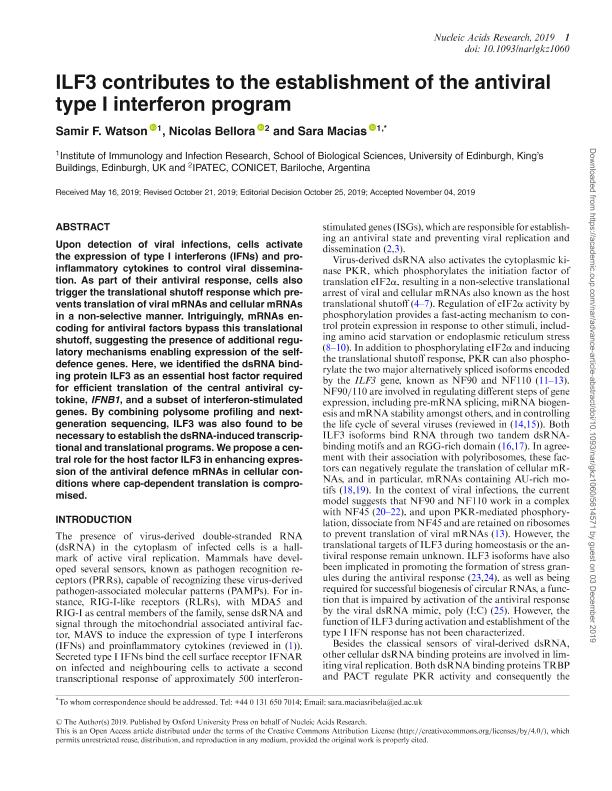Mostrar el registro sencillo del ítem
dc.contributor.author
Watson, Samir

dc.contributor.author
Bellora, Nicolás

dc.contributor.author
Macias Numa, Sara Magdalena del Valle

dc.date.available
2020-12-18T17:26:21Z
dc.date.issued
2020-01
dc.identifier.citation
Watson, Samir; Bellora, Nicolás; Macias Numa, Sara Magdalena del Valle; ILF3 contributes to the establishment of the antiviral type i interferon program; Oxford University Press; Nucleic Acids Research; 48; 1; 1-2020; 116-129
dc.identifier.issn
0305-1048
dc.identifier.uri
http://hdl.handle.net/11336/120865
dc.description.abstract
Upon detection of viral infections, cells activate the expression of type I interferons (IFNs) and pro-inflammatory cytokines to control viral dissemination. As part of their antiviral response, cells also trigger the translational shutoff response which prevents translation of viral mRNAs and cellular mRNAs in a non-selective manner. Intriguingly, mRNAs encoding for antiviral factors bypass this translational shutoff, suggesting the presence of additional regulatory mechanisms enabling expression of the self-defence genes. Here, we identified the dsRNA binding protein ILF3 as an essential host factor required for efficient translation of the central antiviral cytokine, IFNB1, and a subset of interferon-stimulated genes. By combining polysome profiling and next-generation sequencing, ILF3 was also found to be necessary to establish the dsRNA-induced transcriptional and translational programs. We propose a central role for the host factor ILF3 in enhancing expression of the antiviral defence mRNAs in cellular conditions where cap-dependent translation is compromised.
dc.format
application/pdf
dc.language.iso
eng
dc.publisher
Oxford University Press

dc.rights
info:eu-repo/semantics/openAccess
dc.rights.uri
https://creativecommons.org/licenses/by-nc-sa/2.5/ar/
dc.subject
Antiviral response
dc.subject
Translational shutoff
dc.subject
Polysome profiling
dc.subject
ILF3
dc.subject
Next-generation sequencing
dc.subject.classification
Bioquímica y Biología Molecular

dc.subject.classification
Ciencias Biológicas

dc.subject.classification
CIENCIAS NATURALES Y EXACTAS

dc.title
ILF3 contributes to the establishment of the antiviral type i interferon program
dc.type
info:eu-repo/semantics/article
dc.type
info:ar-repo/semantics/artículo
dc.type
info:eu-repo/semantics/publishedVersion
dc.date.updated
2020-08-05T16:08:53Z
dc.identifier.eissn
1362-4962
dc.journal.volume
48
dc.journal.number
1
dc.journal.pagination
116-129
dc.journal.pais
Reino Unido

dc.journal.ciudad
Oxford
dc.description.fil
Fil: Watson, Samir. University of Edinburgh; Reino Unido
dc.description.fil
Fil: Bellora, Nicolás. Consejo Nacional de Investigaciones Científicas y Técnicas. Centro Científico Tecnológico Conicet - Patagonia Norte. Instituto Andino Patagónico de Tecnologías Biológicas y Geoambientales. Universidad Nacional del Comahue. Instituto Andino Patagónico de Tecnologías Biológicas y Geoambientales; Argentina
dc.description.fil
Fil: Macias Numa, Sara Magdalena del Valle. University of Edinburgh; Reino Unido
dc.journal.title
Nucleic Acids Research

dc.relation.alternativeid
info:eu-repo/semantics/altIdentifier/url/https://academic.oup.com/nar/advance-article/doi/10.1093/nar/gkz1060/5614571
dc.relation.alternativeid
info:eu-repo/semantics/altIdentifier/doi/http://dx.doi.org/10.1093/nar/gkz1060
Archivos asociados
